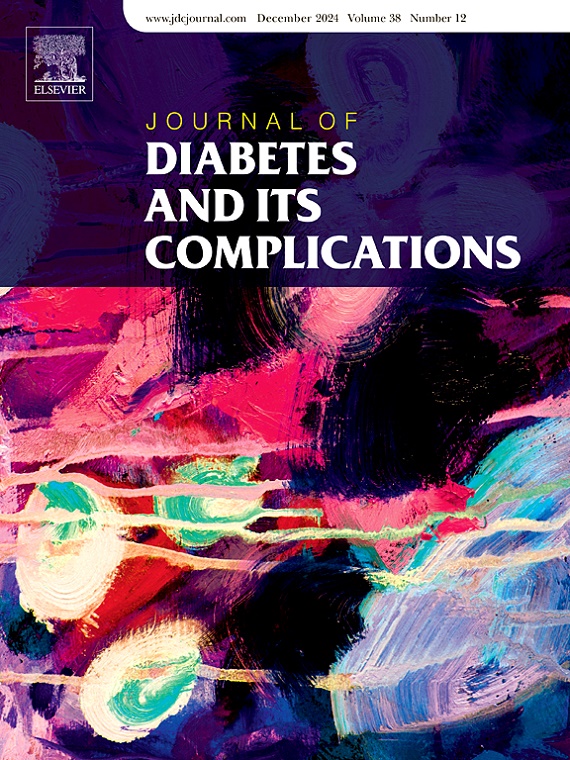胰岛素自动给药系统(AID)对生活质量(QoL)的影响:AID-QoL问卷的验证
IF 2.9
3区 医学
Q3 ENDOCRINOLOGY & METABOLISM
引用次数: 0
摘要
背景和目的有证据支持自动胰岛素输送(AID)系统在改善糖代谢结局方面的有效性。然而,关于它们对生活质量(QoL)的影响的数据有限。本研究旨在开发并验证一套使用AID系统评估1型糖尿病(T1DM)患者生活质量的问卷(AID-QoL)。研究人员按照标准化程序编制并验证了一份调查问卷,并对219名使用AID系统进行胰岛素治疗的T1DM患者进行了调查。结果专家间一致性分析显示,Cronbach's alpha系数为0.720,表明aids - qol的29个条目具有可接受的一致性水平。复测一致性的基础相关系数为0.745,证明了“实质性”的可靠性。对219名患有T1DM的受试者进行问卷调查显示,AID系统对糖代谢管理的满意度较高,对AID系统技术方面的满意度略低,对心理和社会福祉有积极影响,对技术有很高的信心。结论aids - QoL问卷是一种新验证的、可靠的、易于使用的工具,可用于测量通过AID系统接受胰岛素治疗的T1DM患者的生活质量和满意度。本文章由计算机程序翻译,如有差异,请以英文原文为准。
Impact of automated insulin delivery (AID) systems on quality of life (QoL): Validation of the AID-QoL questionnaire
Background and aim
Evidence supports the efficacy of automated insulin delivery (AID) systems in improving glycometabolic outcomes. However, limited data are available on their impact on quality of life (QoL). This study aimed to develop and validate a questionnaire to assess QoL in subjects with type 1 diabetes mellitus (T1DM) using AID system (AID-QoL).
Patients and methods
A questionnaire was developed and validated following a standardized procedure and administered to 219 subjects with T1DM who were using AID systems for insulin therapy.
Results
Analysis of inter-expert agreement for internal consistency showed a Cronbach's alpha coefficient of 0.720, suggesting an acceptable level of consistency across the 29 items of the AID-QoL. The infraclass correlation coefficient for retest agreement was 0.745, demonstrating “substantial” reliability. Administration of the questionnaire to the 219 subjects with T1DM showed that AID systems contributed to high satisfaction with glycometabolic management, a slightly lower satisfaction with the technical aspects of the AID systems, a positive impact on psychological and social well-being, and a high level of confidence in the technology.
Conclusion
The AID-QOL questionnaire is a newly validated, reliable, easy-to-use tool for measuring QoL and satisfaction in subjects with T1DM who are receiving insulin treatment via AID systems.
求助全文
通过发布文献求助,成功后即可免费获取论文全文。
去求助
来源期刊

Journal of diabetes and its complications
医学-内分泌学与代谢
CiteScore
5.90
自引率
3.30%
发文量
153
审稿时长
16 days
期刊介绍:
Journal of Diabetes and Its Complications (JDC) is a journal for health care practitioners and researchers, that publishes original research about the pathogenesis, diagnosis and management of diabetes mellitus and its complications. JDC also publishes articles on physiological and molecular aspects of glucose homeostasis.
The primary purpose of JDC is to act as a source of information usable by diabetes practitioners and researchers to increase their knowledge about mechanisms of diabetes and complications development, and promote better management of people with diabetes who are at risk for those complications.
Manuscripts submitted to JDC can report any aspect of basic, translational or clinical research as well as epidemiology. Topics can range broadly from early prediabetes to late-stage complicated diabetes. Topics relevant to basic/translational reports include pancreatic islet dysfunction and insulin resistance, altered adipose tissue function in diabetes, altered neuronal control of glucose homeostasis and mechanisms of drug action. Topics relevant to diabetic complications include diabetic retinopathy, neuropathy and nephropathy; peripheral vascular disease and coronary heart disease; gastrointestinal disorders, renal failure and impotence; and hypertension and hyperlipidemia.
 求助内容:
求助内容: 应助结果提醒方式:
应助结果提醒方式:


